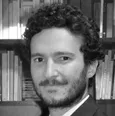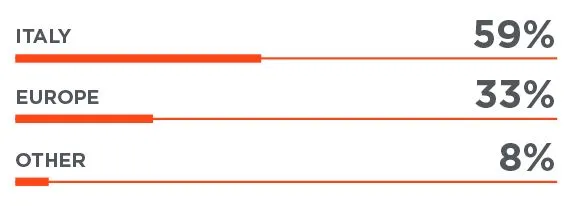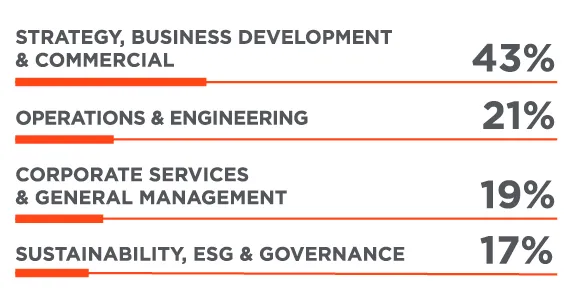
Today, sustainability is a strategic lever for creating value and standing out in the market.
Our Executive Master guides you on this journey, helping you translate sustainability into concrete results: reduced operational costs, access to new markets, strengthened brand reputation, and proactive management of climate, environmental, and regulatory risks.
Through a practical, impact-oriented approach, you’ll delve into crucial topics such as the circular economy, green technologies, sustainable innovation, ESG reporting, and data-driven tools for strategic sustainable transition decisions.
The program stands out for its applied focus: vertical activities in key sectors—Food, Fashion, Energy, Automotive, and Mechatronics—conducted with the direct contribution of our partner companies. They’ll bring real-world experiences, concrete cases, and professional development opportunities directly into the classroom.
This program is designed for ambitious managers who want to do business sustainably, lead change, and generate tangible results with competence, vision, and leadership.
The Executive Master in Sustainability Transition Management is also available in a Graduate Master’s format, designed for recent graduates who wish to pursue a career in the field of sustainability.
Learn more and apply here: Master Sustainability Transition Management (Full Time) | BBS
Accreditation

Bologna Business School is EQUIS – EFMD Quality Improvement System accredited, one of the most important international quality assessment and continuous improvement systems for Schools of Management and Business Administration.

Matteo Mura
Scientific Director
matteo.mura@unibo.it
" There are no alternatives to sustainability. The companies that understood this have achieved better performances. This Executive Master is created to train professionals capable of rethinking the value creation process within the company in line with the transition to low CO2 emissions, the circular economy and the SDGs. "
Structure
COURSES
The course will provide an overview of critical global standards and frameworks regarding corporate sustainability
developed by the UN and EU – with particular focus on the UN Guiding Principles on Business and Human Rights, the upcoming EU
Corporate Sustainability Due Diligence Directive, and the 2030 Agenda for Sustainable Development (the SDGs). Additionally, students
will increase their awareness of key pressure points of corporate accountability: civil society, and investors — and how understanding
how by working with these key stakeholders, companies can become truly sustainable in the long term.
Human-caused climate change is one of the most serious issue of our time and it portends
unprecedented environmental changes for our societies and future generations. Terms like “global
warming”, “climate change” or “greenhouse effect” are nowadays commonly used by non-specialists,
although this is often done without a clear understanding of the science behind them. Understanding
the science of human-caused climate change is essential to understand the economic, political and
moral dimension of it, and ultimately to tackle it. The objective of this course is to explain the basics of
the climate change science in a concise yet rigorous way, providing the scientific knowledge which
underlies all aspect of the human-induced climate change problem.
The goal is to develop participants’ awareness of their own leadership style and boost some of their key skills to manage processes of change in risk situations with authority. The program is based on experiential learning: Participants alternate meetings which are aimed at doing tasks at different moments to observe their behavior, participants will benefit from the assistance of professionals and managers who have significant experience in leading groups and organizations to excellent results
Ghini MassimilianoBackground on Artificial Intelligence Techniques, overview on main challenges and risks of AI for sustainable development based on the SDGs. Main focus on practical cases study based on equitable, unbiased and trustworthy AI systems, sustainable energy management through AI, and hate speech monitoring through AI.
De Filippo AllegraThe course will offer students a multidimensional perspective on the dynamic links between human societies and the environment, using insights from environmental, resource, and ecological economics. The course will particularly focus on climate change and the associated societal responses, spanning multiple methodologies and approaches. At the end of the course, students will have a comprehensive understanding of sustainability issues, the methods to study them, and the policies to address them.
Sarmiento LuisOn the one hand, the module aims to provide Operations’ basics within modern production and service delivery systems. Following this initial framework, it will be possible to deepen the role of automation and digitalization within the modern Supply Chain and in particular the effect of enabling technologies foreseen by Industry 4.0.
Bortolini MarcoThis course is premised on the notion that sustainability represents a fundamental paradox: at the current moment, sustainability presents itself as a goal that can only be achieved through a radical transformation of the ways that we relate to each other and the environment—sustainability is premised upon the unavoidability of transformation. The goal of this course is therefore not to import one or several ethical theories into the world of business and commerce in order to form moral judgments about business practices, or to train business leaders to be more efficient decision makers. Our task is to identify and navigate ethical dilemmas that arise when we entertain sustainability as a guiding principle for our individual, organizational, and global actions.
Valgenti RobertOver the last decade sustainability, corporate social responsibility and stakeholder management practices have become paramount for companies as well as for the society at large. Although most companies have developed sustainability programs over the years, as they’re cutting carbon emissions, reducing waste, and otherwise enhancing operational efficiency, we are witnessing a mishmash of sustainability tactics that does not add up to a sustainable strategy. To endure, a sustainable strategy has to cope with the competing – and apparently divergent – interests of all stakeholders: investors, employees, customers, governments, NGOs, and society.
In this context corporate Performance Measurement Systems (PMS) play a key role as they help companies to formalize and implement their sustainable strategies as well as to proactively identify new trajectories that help companies to appropriately reconcile the trade-offs between different stakeholders’ wants and needs.
Canal Vieira Leticia
The purpose of this module is to increase awareness of the role and functioning of modern corporations as sustainability challenges, opportunities, and solutions emerge. My objective is to enhance our collective awareness of the multiplicity of issues associated with sustainability and explore what all of this means for firms. Towards this end, I have outlined three facets of sustainability – adapting to new demands, dealing with multiple stakeholders and creating a temporal horizon– that can serve as the basis for deepening your understanding of issues connected with sustainability.
Esposito MarkOverall aim of this course is to cover the most important aspects of value chain, including those aspects that concern interorganizational/supply chain or intraorganizational issues, e.g., sourcing and distribution, and to explain how sustainability-oriented innovation needs to be considered across all the aspects. Above all, instead of sustainability being treated separately, the intention in this course is that sustainability-oriented approach is considered in the context of each topic.
Miandar ToloueYou may want to start a new green and sustainable venture. You may find yourself starting a new green and sustainable venture in the future. You may find yourself working for an entrepreneur, funding entrepreneurs, or having to work with them. Or you may simply want to be more entrepreneurial in your own career. The ultimate purpose of the course is to explore the many dimensions of new venture creation & growth in independent as well corporate settings looking at both process and people involved in assessing ideas, exploiting opportunities, and converting concepts into green and sustainable businesses that can really 2 add up to a global sustainable strategy agenda. The candidates will develop a
methodological toolkit to design, understand, and evaluate green business projects.
The course will be composed of five sections. The first part will be an introduction to renewable energy as a global economic sector and how it was possible to transform a set of political, social and environmental targets into a thriving and growing global sector. The second part will present the common key variables of renewable energy business and how the main associated risks are tackled. The third part will delve specifically on the debt financing techniques applied to the green economy. In particular, the students will learn how a renewable energy project can raise debt to finance during the different phases of its lifecycle: from development, to construction and operations. The fourth part will expose students on how an equity investor looks at this sector and how to evaluate the opportunities within a certain risk/return spectrum. A special focus will be devoted on how investors calculate investment returns of renewable energy projects taking into account commercial, legal, governmental, technical and business aspects. In the last part of the course a real life business case will be analyzed with particular attention to which key performance indicators can be used – financial, social, environmental – for analysing such an investment.
Vescovo ClaudioThe course highlights the risks of greenwashing and emphasizes the significance of ethical communication in sustainability matters. Students will learn to recognize and combat deceptive practices while promoting genuine and transparent sustainability efforts. The goal is to equip students with the skills needed to foster honest sustainability communication, ensuring a responsible corporate governance and avoiding reputational and legal risks.
Flamini ElisaMoving from linear to circular economy needs a complete rethinking of products, processes and supply chains. This transition calls for the adoption of an anticipatory approach based on which the life-span, the functions, and the generation of waste should be kept in mind in the design stage to identify and prevent potential impacts in each step of the value chain but also maximize, add and maintain value in the further loops. Despite the existence of waste management systems, materials are still a pervasive presence in the environment, with resulting social concerns. By reconnecting societal needs and environmental pressures with company value proposition, externalities can be reduced, and value can be shared. Circular economy is the way to embrace corporate responsibility: reuse, repair, refurbish, remanufacture and repurpose, over than recycling, are among the circular strategies that support organizations to address a socio-technical innovation and change the business models in a sustainable way.
Foschi EleonoraFaculty
Faculty members at Bologna Business School work together offering outstanding teaching standards. An international and interdisciplinary approach is guaranteed by a joint team of distinguished national core professors, adjunct, visiting professors, guest speakers and top managers.
-
Marco Bortolini
Associate Professor of Industrial Mechanical Systems Engineering
University of Bologna
-
Leticia Canal Vieira
Adjunct Professor
University of Bologna
-
Allegra De Filippo
Junior Assistant Professor
Dipartimento di Informatica-Scienza e Ingegneria dell’Università di Bologna
-
Mark Esposito
Visiting Professor of Strategy
Bologna Business School
-
Elisa Flamini
Sustainability Manager
Green Media Lab
-
Eleonora Foschi
Permanent Researcher in Circualr Economy
Italian National Agency for New Technologies, Energy and Sustainable Economic Development (ENEA)
-
Gardner Luzzatto Nina
Adjunct professor in the international law department
Johns Hopkins SAIS - Washington DC and Washington College of Law - American University
-
Massimiliano Ghini
Director
European Center for Team Emotional Intelligence
-
Antonio Paco Giuliani
Associate Professor of Entrepreneurship
IÉSEG - School Of Management
-
Toloue Miandar
Junior Assistant Professor of Organization and Human Resource Management
University of Bologna
-
Salvatore Pascale
Junior Assistant Professor of Physics of the Earth and of the Circumterrestrial Medium
University of Bologna
-
Luis Sarmiento
Environmental Economist
Euro-Mediterranean Center on Climate Change (CMCC) in Milan
-
Robert Valgenti
Full Professor of Philosophy
Lebanon Valley College
-
Claudio Vescovo
Managing Director - Head of Credit Fund
Glennmont
CLASS PROFILE 2024
GEOGRAPHICAL ORIGIN

PROFESSIONAL BACKGROUND

This program is designed for managers, entrepreneurs, and professionals who want to lead the sustainable transition within their organizations with a strategic and results-oriented vision. The Master is ideal for those aspiring to integrate sustainability and business, generating concrete impact and a competitive advantage
Alumni

Bianca Bozzone
Founder and Director of Africa office at TruePoint
EMST V - 2023/2024
"The Masters was a unique opportunity to learn, reflect and explore the challenges and opportunities ahead of our contribution to sustainable transition. Appreciated the learning journey curated with global academic expertise together with the access to companies and colleagues who are actively creating solutions to move us forward in our goal of a sustainable future"

Igor Cyrino de Oliveira
Head of Customer Success - Sustainability at Plan A
EMST V - 2023/2024
"The Executive Master in Sustainability Transition Management at Bologna Business School has been a transformative experience for me. The in-depth discussions on climate change, environmental economics, and circularity provided invaluable insights that I apply daily in my work. These learnings have empowered me to influence stakeholders effectively and drive meaningful change within my organization. I highly recommend this program to anyone passionate about sustainability and eager to lead the transition toward a more sustainable future."

Eleonora De Florio
Sustainability consultant, Ernst and Young
Executive Master in Sustainability Transition Management (Ed. 2020/2021)
"The Master enriched me from a professional point of view, providing tools and testimonials to broaden my vision and knowledge on sustainability, and from a human point of view, thanks to the presence of colleagues with different training and backgrounds but who shared the same desire to grow together, get involved and make a difference in the increasingly topical scenario of transition towards an economy focused on sustainability, in all its facets."

Xavier Franco Muntada
Sustainability Projects Leader - Zero Impact Packaging Founder - PactoZero, EMST
EMST I - 2020/2021
"This Master gives you all the elements to understand and promote the changes towards sustainability in your field, plus a fantastic opportunity to meet and engage with people capable of leading that change - your colleagues."
Networking
This master’s program is designed to build connections: between participants, lecturers, professionals, and companies. Site visits, guest speakers, and applied projects foster authentic, international networking.
COMPANIES
Businesses are active participants in the program. Through real challenges and concrete case studies, participants collaborate with partner companies, developing high-impact solutions.
LAMBORGHINI HERA CAVIRO COPROB SCHEIDER ELECTRIC CURTI ENI-SNAM UNIPOL WASP KILOWATT B-PLAS CARTIERA VITEC IMAGINE SOLUTIONS
Programme Advisory Committee
Community
COMMUNITY AND CAREER DEVELOPMENT
During the Master, a series of seminars with head-hunters and HR managers are offered, to provide tools and resources to contribute to your career development and how to enter the job market in leadership positions.
Once the Master is ended, it is possible to join the activities dedicated to the Community, to further increase your own network. Furthermore, meetings open to the entire BBS Community are periodically scheduled with managers, entrepreneurs and guests, focusing on the different scenarios of a constantly evolving society and market.
FEES
The registration fee for the Master’s course on a company basis is
18.200 Euros + VAT.
The registration fee for the Master’s course on an individual basis is
15.200 Euros + VAT.
YOUR FUTURE STARTS AT BBS. CONTACT OUR TEAM FOR MORE INFORMATION ON:
-
Scholarships and Financial Aid
-
Financing and Payment Plans
-
Professional Funds and Corporate Welfare
For more details, contact us at emst@bbs.unibo.it
Funding
For individual access to the Master’s program, two financing options are available:
“MERIT” LOAN – BANCA INTESA
-
No collateral required
-
Special interest rates
-
24-month grace period with repayment over 30 years
-
To qualify, you need a degree score of at least 98/110, residence in Italy, and enrollment in the Master’s program.
“FUTURIAMO” LOAN – BANCA BNL
-
Special interest rates
-
Repayment period of 10 years
-
Option to delay the first payment for up to 36 months
- To qualify, you need to be residence in Italy, and enrollment in the Master’s program.
For more information, email us at emst@bbs.unibo.it
INTERPROFESSIONAL FUNDS
Special terms are available thanks to Interprofessional Funds:
-
Fondimpresa – for executives / middle management
-
Fondo Dirigenti PMI – for executives in small and medium-sized industrial companies
-
Fondirigenti – for executives
SCHOLARSHIPS
Investing in your education is a crucial step for your professional future. Bologna Business School offers a range of scholarships and benefits designed to recognize merit, support talent, and encourage the participation of professionals and companies.
BENEFITS FOR INDIVIDUAL APPLICANTS
If you are applying as an individual, you can access several limited scholarships, awarded based on specific criteria.
Submit your CV to the Admissions Team at emst@bbs.unibo.it to explore the scholarship options available to you.
Additionally, if you are connected to our Alumni network, you can benefit from further advantages:
- Alumni Referral: 20% Discount
Note: Scholarships cannot be combined.
BENEFITS FOR COMPANIES
Companies wishing to invest in the training of their employees can benefit from advantageous conditions based on the timing of registration:
- Early Bird (by 30/09/2025) | 11% reduction
Note: Early Bird conditions are valid for registrations made within the specified dates.
HOW TO APPLY
Scholarships are awarded during the selection process, based on a first-come, first-served basis, and an evaluation of your CV in relation to the eligibility requirements for each scholarship.
REQUIREMENTS
The Executive Master in Sustainability Transition Management aims to provide Managers and Professionals with operational tools and strategic knowledge in order to develop their professional career on global sustainability.
The Master is open to graduates with more than 3 years of professional experience and to non graduates with at least 5 years of work experience.
APPLICATION PROCESS
Admission is subject to passing an online selection process by appointment (contact Gaia Giuffredi – emst@bbs.unibo.it).
The selection process consists of:
Entry test: duration max 30 minutes, online
Assessment interview with Directors of the master, duration 30 minutes, online
The selection process is non-binding on entry and will assess master’s requirements (educational qualification and work experience), profile and development goals.
FAQs
The selection process consists of an interview with the Master’s Director, organised by the Program Manager upon candidate request and after sending of the Curriculum Vitae. The interview is not binding on enrollment.
No, it is not. The Executive Masters are not University Masters, therefore they do not have ECTS credits (European Credit Transfer and Accumulation System), that in Italy are called “crediti formativi universitari (CFU).
At the end of the Master, a certificate of attendance (which includes the achieved results) and a Diploma of Participation (upon verification of successful completion of each course and of at least a 70% of class attendance) are issued.
The program manager can provide attendance certificates at the end of each lesson to those who require it.
No, because it is not a university Master.



